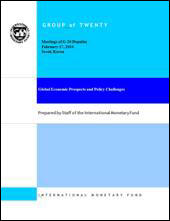Group of Twenty -- Meetings of G-20 Deputies
IMF Note on Global Economic Prospects and Policy Challenges
February 27, 2010 - Seoul, Korea
About the Executive Summary
The Following executive summary is from a note by the Staff of the IMF prepared for the February 27, 2010 meeting of the Group of Twenty Finance Ministers and Central Bank Governors in Seoul, Korea.
Read the Full text ![]()
Executive Summary
The global recovery is off to a stronger start than anticipated earlier, but it is proceeding at different speeds in the various regions. Recovery in advanced economies is being largely driven by extraordinary policy support and the turn in the inventory cycle, with strong domestic demand and higher commodity prices adding to the growth impetus in key emerging economies.
The speed of recovery is expected to vary considerably across G-20 countries, with weaker and more fragile growth in advanced economies contrasting with robust expansions in emerging economies, particularly in Asia. After contracting by 0.8 percent in 2009, global output is expected to expand by around 4 percent in 2010 and 4.3 percent in 2011, an upward revision of ¾ and 0.1 percentage points, respectively, relative to the October World Economic Outlook
Risks to the outlook are on balance moderately to the downside. The most immediate risk is intensifying market concerns about fiscal sustainability in some smaller advanced economies, leading to contagion of rising risk premia across sovereign bond markets and higher borrowing costs for households and companies.
A multispeed recovery means that policy challenges vary across countries. With recovery in most advanced G-20 economies expected to be weak, policy stimulus should be maintained at least through 2010. However, macroeconomic support cannot substitute for restructuring in securing durable growth; in particular, financial system reform needs to proceed with greater urgency to support aggregate credit while limiting future risks. Some major emerging economies may have to unwind stimulus faster due to more rapid recoveries.
Policymakers need to formulate and begin to implement strategies for exiting from crisis-related intervention policies. The appropriate timing, pace, and mode of exits depend on the state of the economy and the health of the financial system. Expansionary fiscal policy has a direct impact on debt, while accommodative monetary policy has no obvious direct downside, other things remaining unchanged (e.g., the absence of price pressures in goods, labor, and asset markets). Hence, on balance, fiscal consolidation should take priority. In some emerging economies monetary policy may have to be tightened relatively soon and ahead of fiscal consolidation, due to rising inflation or incipient financial vulnerabilities
Some emerging market countries will have to design policies to manage a surge of capital inflows. The right responses differ across countries, including fiscal tightening to ease pressure on interest rates and greater exchange rate flexibility. Macro-prudential policies aimed at limiting the emergence of new asset price bubbles, reserves accumulation, and carefully designed capital controls can also be part of the appropriate response in certain circumstances.

